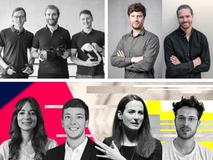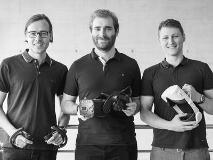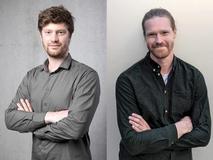CHF 40, 000 for virtual reality for businesses, solutions for solid-state batteries, and solutions to enable remote work abroad
21.09.2022
AtlasVR, eightinks, and Vamoz win Venture Kick's second stage of entrepreneurial and financial support. Their projects revolutionize training procedures by harnessing the potential of virtual reality (VR) technology; enable low production costs for solid-state lithium-ion batteries; and enable companies to let their employees work from anywhere on a temporary basis.
 |
 AtlasVR Co-Founders from left to right Valentin Holzwarth Christian Hirt, and Joy Gisler
|
 eightinks CEO Paul Baade and CBO Leon Baade
|
 Vamoz from left to right: Sophie Boyle - Business & Finance, Daniel Dietrich - Operations & Sales, Isabelle Wildhaber - Legal, Johannes Pecher - Tech
|
AtlasVR: Virtual Reality for business
Traditional vocational training procedures – particularly in heavy machinery and special equipment – are characterized by numerous challenges: They are costly, language- and location-dependent, potentially harmful for trainees, and damaging to the equipment while disregarding the individual learning curves of trainees. Combined with the current skills shortage and the ongoing COVID pandemic, these challenges have fueled the demand for a skilled industrial workforce and on-demand access to vocational training solutions.
AtlasVR AG, a spin-off of ETH Zurich, revolutionizes training procedures by harnessing the potential of virtual reality (VR) technology. The founding team consists of Christian Hirt, Joy Gisler, and Dr. Valentin Holzwarth. Their VR training solutions enable active learning with an intuitive learning-by-doing approach, with no real machine required. By these means, the workforce can train independently of the respective machine tool, wherever and whenever. This saves substantial costs compared to real-world training while increasing trainee motivation and engagement. Entirely focused on a B2B model, specifically in the machine tool industry, AtlasVR AG offers a true end-to-end solution. They accompany their customers from initial contact with the technology via implementation to on-site rollout with options for service maintenance long after deployment.
The Venture Kick funding will be used to develop the AtlasCreator software platform towards the product stage and its market release, and also for business development activities, such as participation in trade fairs and market research. atlasvr.ch
eightinks: solutions for solid-state batteries
State-of-the-art lithium-ion batteries face many challenges. They are heavy, bulky, and expensive. Also, they face safety issues and suffer from long charging times. The next-generation technology is solid-state batteries. Solid electrolytes are rigid lithium-ion conductors with a multitude of upsides: These types of batteries are lighter, smaller, and non-flammable. The technology has already seen billions of investments and prototypes are able to outperform standard batteries. However, widespread adoption is hindered by the lack of suitable manufacturing technology. When switching from a liquid electrolyte (state of the art) to a solid electrolyte (next-gen) there must not be new production bottlenecks in order to keep costs low.
eightinks' solution is designed for the giga-scale by delivering high throughputs and simplifying the cell manufacturing process. The project is led by Dr. Paul Baade, a Pioneer Fellow at ETH Zürich, affiliated with the Materials and Device Engineering Group at D-ITET, Leon Baade is responsible for the business development and Prof. Vanessa Wood serves as the scientific advisor. Their patented manufacturing technology is compatible with existing equipment and enables low production costs. By keeping scalability and recyclability in mind eightinks strives to produce the best solid-state batteries. According to Statista, the global lithium-ion battery market was valued at around USD 40.5 billion in 2020. With the rapid growth of electric vehicle sales, the demand for lithium-ion batteries is skyrocketing as well and the market is expected to reach close to USD 200 billion by 2030. By then over 85% of the lithium-ion battery demand is coming from E-mobility solutions. They can observe great efforts from European car manufacturers to establish a battery supply chain within Europe. Therefore, they have a clear long-term focus on the automotive industry which benefits greatly from increased battery performance.
The venture kick funding will be used to demonstrate their technology in commercially relevant devices (pouch cells). Therefore, they need to purchase the necessary lab equipment to build these cell formats. eightinks.com
Vamoz: intelligent solutions to enable remote work abroad
A new style of working was created during the pandemic and employees got used to working remotely - also from different countries. Companies now want to offer temporary remote work abroad to employees as an official benefit, in order to attract and retain top talent - but they struggle to get a handle on the legal and business risks, as well as the extra workload. They fear the consequence of high financial costs and reputational damage from overstepping intransparent and unclear legal regulations (e.g. taxation, social security, data protection), as well as the risk of losing control and team cohesion.
Vamoz's team is composed of co-founders from the University of St. Gallen (HSG) Prof. Isabelle Wildhaber and Dr. Daniel Dietrich, along with Sophie Boyle and Johannes Pecher. They enable companies to let their employees work from anywhere on a temporary basis - whether that means working from the beach in Mexico or visiting relatives in Italy. This is done by assessing all relevant legal & business risks and guiding the operational process from beginning to end. The core solution is a web-based application, where employees file their remote work requests, HR makes informed approval decisions, and line managers keep an overview of who is working from where. Companies increase productivity and the happiness of their employees, whilst keeping control of their workforce & mitigating the risks. In total, a significant number of remote work requests have already been processed for multiple pilot partners since Q1 2022 and the beta version of the software tool is scheduled for release in Q3 2022.
The Venture Kick funds will be used to support the product launch and beyond, with a focus on expanding the customer base and recruiting key skills, as well as developing the product further based on the beta phase learnings. vamoz.io
Traditional vocational training procedures – particularly in heavy machinery and special equipment – are characterized by numerous challenges: They are costly, language- and location-dependent, potentially harmful for trainees, and damaging to the equipment while disregarding the individual learning curves of trainees. Combined with the current skills shortage and the ongoing COVID pandemic, these challenges have fueled the demand for a skilled industrial workforce and on-demand access to vocational training solutions.
AtlasVR AG, a spin-off of ETH Zurich, revolutionizes training procedures by harnessing the potential of virtual reality (VR) technology. The founding team consists of Christian Hirt, Joy Gisler, and Dr. Valentin Holzwarth. Their VR training solutions enable active learning with an intuitive learning-by-doing approach, with no real machine required. By these means, the workforce can train independently of the respective machine tool, wherever and whenever. This saves substantial costs compared to real-world training while increasing trainee motivation and engagement. Entirely focused on a B2B model, specifically in the machine tool industry, AtlasVR AG offers a true end-to-end solution. They accompany their customers from initial contact with the technology via implementation to on-site rollout with options for service maintenance long after deployment.
The Venture Kick funding will be used to develop the AtlasCreator software platform towards the product stage and its market release, and also for business development activities, such as participation in trade fairs and market research. atlasvr.ch
eightinks: solutions for solid-state batteries
State-of-the-art lithium-ion batteries face many challenges. They are heavy, bulky, and expensive. Also, they face safety issues and suffer from long charging times. The next-generation technology is solid-state batteries. Solid electrolytes are rigid lithium-ion conductors with a multitude of upsides: These types of batteries are lighter, smaller, and non-flammable. The technology has already seen billions of investments and prototypes are able to outperform standard batteries. However, widespread adoption is hindered by the lack of suitable manufacturing technology. When switching from a liquid electrolyte (state of the art) to a solid electrolyte (next-gen) there must not be new production bottlenecks in order to keep costs low.
eightinks' solution is designed for the giga-scale by delivering high throughputs and simplifying the cell manufacturing process. The project is led by Dr. Paul Baade, a Pioneer Fellow at ETH Zürich, affiliated with the Materials and Device Engineering Group at D-ITET, Leon Baade is responsible for the business development and Prof. Vanessa Wood serves as the scientific advisor. Their patented manufacturing technology is compatible with existing equipment and enables low production costs. By keeping scalability and recyclability in mind eightinks strives to produce the best solid-state batteries. According to Statista, the global lithium-ion battery market was valued at around USD 40.5 billion in 2020. With the rapid growth of electric vehicle sales, the demand for lithium-ion batteries is skyrocketing as well and the market is expected to reach close to USD 200 billion by 2030. By then over 85% of the lithium-ion battery demand is coming from E-mobility solutions. They can observe great efforts from European car manufacturers to establish a battery supply chain within Europe. Therefore, they have a clear long-term focus on the automotive industry which benefits greatly from increased battery performance.
The venture kick funding will be used to demonstrate their technology in commercially relevant devices (pouch cells). Therefore, they need to purchase the necessary lab equipment to build these cell formats. eightinks.com
Vamoz: intelligent solutions to enable remote work abroad
A new style of working was created during the pandemic and employees got used to working remotely - also from different countries. Companies now want to offer temporary remote work abroad to employees as an official benefit, in order to attract and retain top talent - but they struggle to get a handle on the legal and business risks, as well as the extra workload. They fear the consequence of high financial costs and reputational damage from overstepping intransparent and unclear legal regulations (e.g. taxation, social security, data protection), as well as the risk of losing control and team cohesion.
Vamoz's team is composed of co-founders from the University of St. Gallen (HSG) Prof. Isabelle Wildhaber and Dr. Daniel Dietrich, along with Sophie Boyle and Johannes Pecher. They enable companies to let their employees work from anywhere on a temporary basis - whether that means working from the beach in Mexico or visiting relatives in Italy. This is done by assessing all relevant legal & business risks and guiding the operational process from beginning to end. The core solution is a web-based application, where employees file their remote work requests, HR makes informed approval decisions, and line managers keep an overview of who is working from where. Companies increase productivity and the happiness of their employees, whilst keeping control of their workforce & mitigating the risks. In total, a significant number of remote work requests have already been processed for multiple pilot partners since Q1 2022 and the beta version of the software tool is scheduled for release in Q3 2022.
The Venture Kick funds will be used to support the product launch and beyond, with a focus on expanding the customer base and recruiting key skills, as well as developing the product further based on the beta phase learnings. vamoz.io


